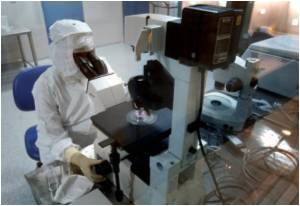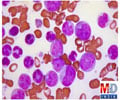
Acute myeloid leukemia (AML) is an acute type of blood cancer that starts in the blood-forming cells in the bone marrow. AML is the most common type of acute leukemia in adults.
While many patients are able to fight off the disease at first with conventional chemotherapy, long-term outcomes in the majority of patients are poor due to disease relapse.
"To improve patient outcomes, it is crucial to understand the mechanisms of AML relapse and to develop effective treatment strategies to reduce AML relapse," explains Dr. Ishikawa who led the study.
Over the last decade, bone marrow cells called leukemia stem cells (LSC) have been recognized as key players in human AML pathogenesis as well as chemotherapy resistance and relapse. Previous studies have suggested that LSCs might cause relapse if they are not properly eliminated by conventional chemotherapy.
By transplanting LSCs obtained from AML patient samples into immune-deficient newborn mice, Ishikawa and his team developed a mouse model for AML, which they used to study AML and LSCs.
Advertisement
In the present study, the researchers screened a library of tens of thousands of small molecules that could act as therapeutic agents by specifically inhibiting HCK. They isolated one small molecule that was highly active against patient-derived AML LSCs grown in culture. To assess the potential of this molecule for therapeutic development, they administered it to their mouse model of AML. They find that administration of this molecule results in a significant reduction of human AML cells in the blood of the mice, as well as a reduction of human AML LSCs in the bone marrow of the mice.
Advertisement
"These findings suggest that treatment with this small molecule may help reduce relapse in AML patients," conclude the authors.
"However, more work is needed before this small molecule can be delivered to patients as a therapeutic agent. We now plan to proceed with a more in-depth biochemical and pharmacologic characterization of this compound in the lab, to find out whether it is safe and to determine which subset of AML patients could benefit from it. Ultimately, we hope to develop a drug that can be used in the clinic," adds Dr. Ishikawa.
Source-Eurekalert















